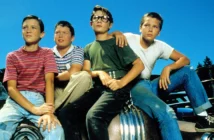Being anything but generic, Boys From County Hell balances horror and comedy like some of the greatest dark comedies of all time.
As far as horror-comedies go, Boys From County Hell sits comfortably alongside fellow greats like Shaun of the Dead and From Dusk Till Dawn. Featuring a great Irish cast with the likes of Jack Rowan (Peaky Blinders) and Louisa Harland (Derry Girls), what’s most surprising is the film’s great balancing of Irish folklore, goreific horror, and humour that gives it a lick of identity that’s hard not to love.
Following the story of Rowan’s Eugene, Boys From County Hell tells a story steeped in regret (the legend of vampires) all the while containing a surprising amount of heart. When Eugene and his friends disturb the burial ground of an Irish Vampire, they set upon themselves surviving the night and putting an end to the horror they inadvertently caused. Whilst sounding a little generic, Boys From County Hell is anything but, using its humour and self-awareness to help mould the plot into something deliciously more outlandish. There are decapitations, limbs used as vampire stakes and a graphic amount of impalement that makes this a horror steeped in gore. Nothing in the film is necessarily aimed to make you jump, and even when the film utilises its impressive amounts of blood, it’s juxtaposed by top-notch sarcasm and a tone that could only work in dark comedy.
The best way I can describe Boys From County Hell is a vampiric Irish take on Shaun on the Dead. That’s not to say the film purposefully tries to match Edgar Wright’s classic or anything, but there’s a self-awareness in the use of excellently delivered one-liners or comedic timings that helps it compare well to Wright’s film. Yet, Boys From County Hell stands on its own two feet and makes itself wholly unique by staying close to its most apparent feature: Irishness. Whether stereotypically or for comedic effect, there’s a whole lot of drinking (at an aptly named pub called “The Stoker”), and its use of Irish folklore grounds the film narratively. For all its comedic barbaricness and veering into the fiction that folklore can sometimes feel like, the use of real-world references and engagement with Bram Stoker’s take on the world of vampires is often used as plot set-up, like when its main characters are trying to discover a vampire’s weakness. Rather than the Irishness of the film being a throwaway caveat, it’s ultimately one of its most important features and that does it credit.
A film like this couldn’t work without excellent performances and that’s not just in its comedic output. Jack Rowan offers some genuinely, if surprisingly, profound moments as Eugene, helping elevate the film past the status of just being a comedy. What garners the most laughs though is Eugene’s relationship with his quick-quipped and sarcastic father, Francis (played by Nigel O’Neill), who easily offers the film’s main source of comedy while allowing for an unlikely strained father-son relationship to take focus. It’s often Eugene’s grumpiness, dismissal of otherworldliness and one-liners that help make the film become a comfortable dark comedy, using a self-aware observational comedy that works too well in horror. Unexpectedly, Louise Harland is probably the least funny of the trio, but that doesn’t make her any less of a delight, often acting as a bridge between characters or as the perfect setup for another joke.
Finally, turning attention away from its characters and plot, there’s a lot of elements to the film that cements its greatness. It uses some great Irish songs to backdrop its moments of action, but even the crafted score works excellently in lending the film an identity of its own. Alongside these are great special effects that are crafted to perfection, and you can definitely feel that the film leans towards a more practical effects kind of horror rather than favouring CGI. Its main vampire is the decrepit human from nightmares, and all its goriest moments feel more physical and horrifying because of its more practical approach to horror.
Boys From County Hell is a ride through and through, one I couldn’t quite get enough of. It’s immediately rewatchable, hilarious, and manages a quintessential Irishness while exploring absurd tales of real-life folklore. Easily one of my favourite films of 2021, I can’t recommend it enough.
Boys from County Hell is available to watch in select cinemas now.




